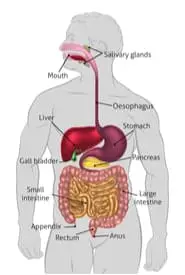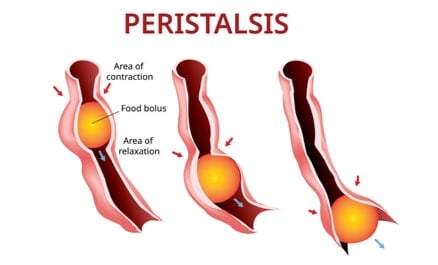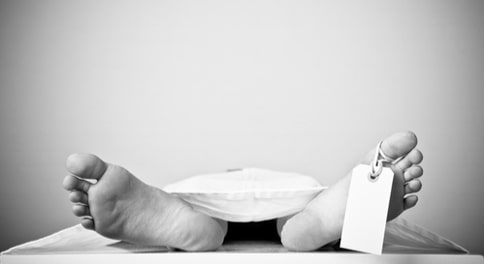Doctors and morticians estimate that 20-50% of people poop when they die.
After death, every muscle in your body relaxes, including the sphincters that are in charge of regulating your bladder and bowels. As a result, if you have anything in your bowels, it will likely be released when you die.
Defecation after Death
We’ve all heard the question asked at one point or another: do you poop when you die?
The answer is short: you might.
When you die, every muscle in your body relaxes, including the sphincters that are in charge of regulating your bladder and bowels. As a result, if you have liquids or solids within your bowels, they will likely be released when you die. More specifically, any stool in your rectum or urine in your urethra will be released.
However, it’s not as bad as it sounds.
The sphincters that control your bowels aren’t the only muscles that relax; the muscles that are responsible for forcefully pushing materials through your gastrointestinal tract relax as well. Because of this, a bowel release after death isn’t like a normal bowel movement. Instead, it is more of a calm release immediately after you die.
Not everyone has a bowel movement when they die. In fact, most doctors and morticians would argue that the number of people who poop is somewhere between 20 and 50%.
In addition to the state of your gastrointestinal tract when you die, the way you die can also influence whether or not you poop. For example, someone who dies unexpectedly from a traumatic event or a non-bowel-related illness, such as anaphylaxis, is more likely to have solids or liquids in their bowels to expel.
Contrarily, someone who dies from an illness that affects your bowels, such as renal failure, has a very low chance of having a bowel release after death.
An Introduction to Digestion

To understand why some people defecate after death and some people don’t, it’s important to understand how the digestive system in your body works.
The digestive system is made up of the gastrointestinal tract (also known as the digestive tract or the GI tract), the liver, the pancreas, and the gallbladder. The digestive system is responsible for collecting nutrients, breaking the nutrients into smaller parts that your body can utilize, and expelling waste.
When you swallow your food, it is pushed to the back of your throat by your tongue. The food then goes down your esophagus and works its way towards your stomach via the esophageal tube. Food is passed down the esophageal tube via rhythmic muscle contractions called peristalsis.
Peristalsis occurs in the muscles throughout your digestive system. As the muscles contract and relax, they push the food further and further down the digestive tract.
At the bottom of your esophageal tube, a sphincter opens to allow the food to enter the stomach. In the stomach, the food is mixed with digestive juices. Bacteria in your stomach also help the digestive juices to break down the food.

The food, liquid, and digestive juice mixture created in the stomach is called chyme. From the stomach, the chyme moves to the small intestine. Peristalsis moves the chyme through the small intestine while also churning and mixing the chyme mixture.
Fun Fact: When your stomach makes gurgling sounds as you digest, they are actually the result of the peristalsis moving the chime through your digestive tract.
In the small intestine, the chyme is mixed with digestive juices from the pancreas, liver, and intestine, causing it to break apart further. While in the small intestine, any nutrients in the food are absorbed into the bloodstream via diffusion.
Anything not absorbed is passed to the large intestine, to become stool. The large intestine removes water from the stool, leaving food, fluid, and older cells from the lining of the digestive tract.
Peristalsis helps move the stool from your large intestine to your rectum, where the stool is stored until your anal sphincter opens up and releases it during a bowel movement.
When you die, this final sphincter will relax, and any stool that is in the rectum will be released.
What Else Happens When you Die?

When you die, your body doesn’t die all at once. The full death process takes a surprising amount of time.
Once you stop breathing and your heart stops beating, the remaining components of your body shut down one at a time in a domino effect.
In addition to your bowels releasing, some other interesting things happen to your body as this process occurs:
1. Your Body Might Keep Moving
Your muscles begin to die once your heart stops pumping oxygen-rich blood through your body. When your muscles die, they contract, causing reflex-like spasms that can make the limbs twitch.
Post-mortem spasms occur up to 12 hours after death. In fact, many nurses and morticians have reported finding bodies in different positions than where they left them.
2. Your Skin Can Be Stained
Once you die, the blood in your body begins to thicken and pool in the lowest points of your body. If the body is left stationary for at least 12 hours, the skin in the areas where the blood has pooled will be stained.
As the blood thickens and pools, it also causes the body temperature to decrease in a process known as algor mortis or the death chill.
3. Your Skin Shrinks
When you die, your skin also dries out. As it dries out it shrinks, causing it to pull away from your cuticles and hair follicles. This phenomenon makes it look as if your hair and nails suddenly grow longer when you die.
4. Rigor Mortis Sets In
Rigor mortis refers to the stiffening of muscles after death. When you stop breathing, your cells stop producing adenosine triphosphate (ATP). Rigor mortis occurs because of a depletion of ATP. ATP is produced metabolically by muscle cells and is responsible for forcing the muscle fibers to relax after contraction.
Within two hours after death, the muscles in your face become rigid. After 6-12 hours, the remaining larger muscles in your body will also stiffen. After 1-2 days, the muscles begin to degrade, and the rigor mortis fades, making the body look more relaxed.
5. Your Wrinkles Disappear
Just like your gastrointestinal muscles, when you die your facial muscles relax as well. This relaxation causes the muscles to stop pulling on the skin of your face. As a result, your wrinkles will lessen or disappear altogether.
Botox mimics this phenomenon by making the facial muscles stop contracting.
5. You Might Moan and Groan
We’ve all heard horror stories of dead people talking. While you won’t be forming full sentences when you die, there is a chance that you will moan and groan.
When you die, your chest cavity will still be full of air. If someone moves your body or pushes on your chest, the pressure can cause air to come up your windpipe and rattle your vocal cords.
As the vocal cords rattle, they can produce moaning, groaning, or whimpering sounds.
Final Details
The thought of defecating when you die can be horrifying. After all, most of us cannot control whether or not we will be one of the 20-50% of people who poop when they die.
However, it’s a normal part of death and not something to feel uncomfortable about. In fact, one doctor stated that they deal with defecation after death so often that they just call it a “code brown” and keep working.
Understanding what happens biologically when we die and why it happens can take away a lot of the fear and stigmas surrounding death. For more information about death and the funeral process, see related articles at https://wilsonsfuneraladvice.com/.

Sources:
https://www.womenshealthmag.com/health/a19903099/what-happens-when-you-die/
https://allthatsinteresting.com/what-happens-to-your-body-when-you-die
https://www.sciencealert.com/watch-here-s-what-happens-when-you-die
https://www.niddk.nih.gov/health-information/digestive-diseases/digestive-system-how-it-works

